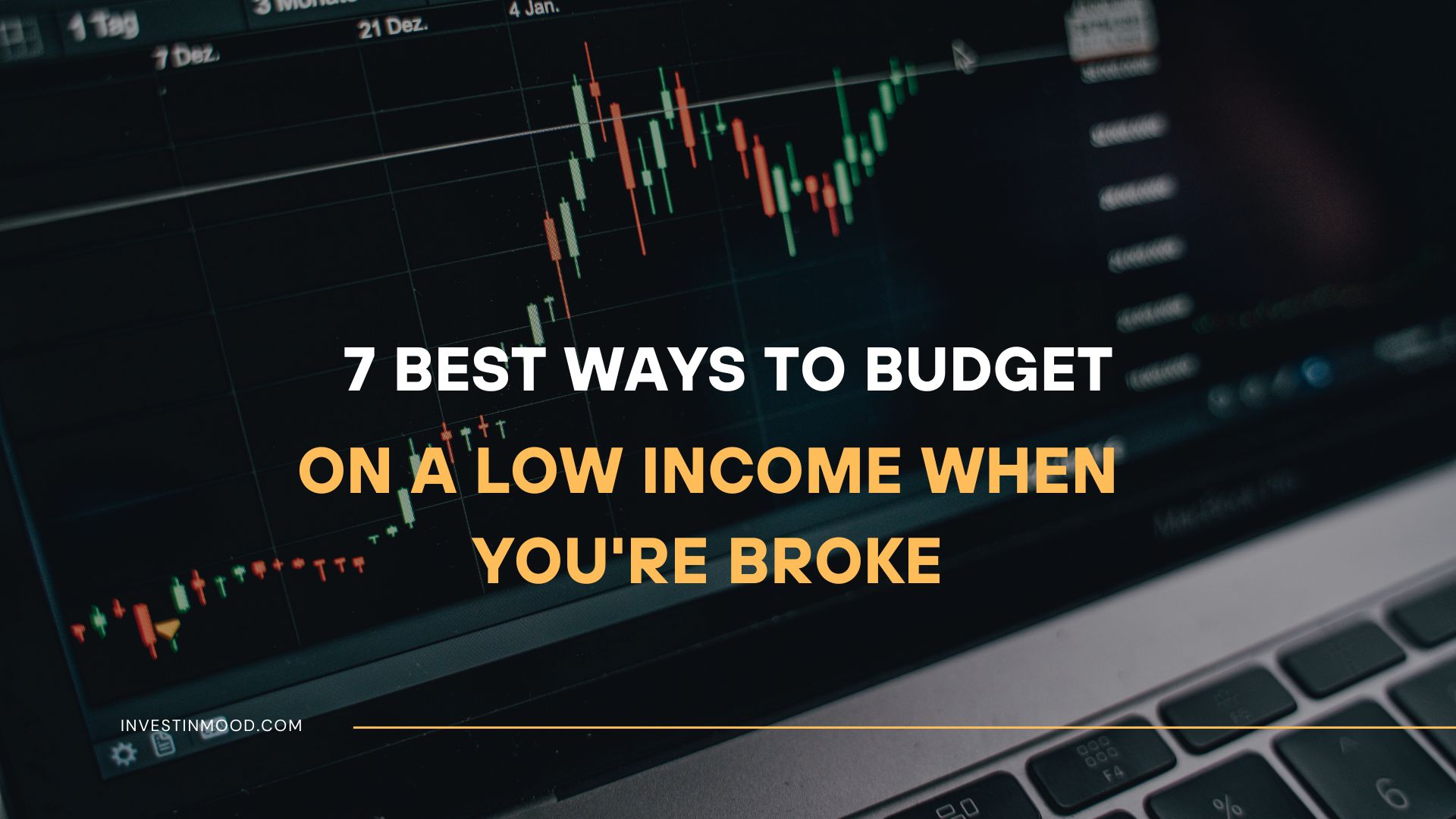
7 Best Ways to Budget on a Low Income When You're Broke
Stretching a limited income can feel like an impossible task, but a solid budget is your most powerful tool to break the cycle of living paycheck-to-paycheck. This step-by-step guide will show you exactly how to create a realistic budget that covers your needs, reduces financial stress, and even helps you start saving, no matter how small your income.
For individuals and families in the US, UK, and Canada, learning to budget effectively is the first step toward financial stability. Using methods like the 50/30/20 rule or zero-based budgeting can help you make the most of every dollar, pound, or euro, ensuring your basic needs are met while working towards your financial goals.
Summary Table
| Aspect | Detail |
|---|---|
| Goal | To create a sustainable spending plan that reduces financial stress and builds savings on a limited income. |
| Skill Level | Beginner |
| Time Required | 1-2 hours (setup); 15 min/week (maintenance) |
| Tools Needed | Bank statements, pay stubs, spreadsheet or budgeting app. |
| Key Takeaway | Budgeting empowers you with a clear plan, ensures essentials are covered, and finds saving opportunities, no matter your income. |
| Related Concepts |
Why Learning to Budget on a Low Income is Crucial
When your income is limited, every financial decision carries more weight. A budget transforms this pressure from a source of stress into a plan of action. It’s not a straitjacket for your spending; it’s a strategic map for your money, ensuring that your essential needs—like rent, food, and utilities—are always prioritized. Without a budget, it’s easy to lose track of where your money is going, leading to overdraft fees, debt, and constant anxiety about making ends meet.
The Problem It Solves: Financial chaos, living paycheck-to-paycheck, unexpected expenses derailing your finances, and the feeling of having no control over your money.
The Outcome: You gain clarity, control, and confidence. You’ll know exactly where your money is going, be prepared for unexpected bills, and can make conscious decisions that slowly but surely improve your financial situation, opening the door to saving for future goals.
Key Takeaways
What You’ll Need Before You Start
Before diving into the step-by-step process, gathering a few things will make your budgeting session smooth and effective.
Knowledge Prerequisites: A basic understanding of your income and regular bills. No advanced financial knowledge is needed!
Data Requirements:
- Your last 2-3 months of bank statements and pay stubs.
- A list of all your monthly bills (rent, utilities, phone, etc.).
- A record of your variable spending (groceries, gas, etc.) from the last month.
Tools & Platforms:
- Pen and Paper: The simplest method. Great for brainstorming.
- Spreadsheet: Google Sheets or Microsoft Excel offer flexibility and calculation functions. You can find many free templates online from sources like the Consumer Financial Protection Bureau.
- Budgeting App: Apps like Mint (being transitioned to Credit Karma) or EveryDollar can automatically import and categorize transactions.
To make tracking your spending effortless, a good budgeting app is essential. Many of the best personal finance apps, like YNAB (You Need A Budget) or PocketGuard, connect directly to your bank accounts to automatically categorize your spending, saving you time and ensuring accuracy.
How to Create a Budget on a Low Income: A Step-by-Step Walkthrough
This guide will walk you through seven powerful methods and steps to take control of your finances. You can use one or a combination of these strategies.
Step 1: Track Your Income and Expenses with Precision
The foundation of any good budget is data. For one month, track every single dollar that comes in and goes out. Don’t judge your spending yet—just record it. Use a notebook, a notes app on your phone, or a budgeting app.
Pro Tip: Carry a small notebook or use your phone’s notes app to log purchases immediately. It’s easy to forget small cash transactions.
Step 2: Choose Your Budgeting Method
Not all budgets are created equal. On a low income, some methods are more practical than others. Here are the two most effective approaches:
- Zero-Based Budgeting (The “Give Every Dollar a Job” Method): This is the gold standard for tight budgets. Your income minus your expenses should equal zero. This doesn’t mean you spend everything; it means every dollar is assigned a purpose—bills, savings, debt repayment, etc.
- Formula: Total Monthly Income – Total Monthly Expenses (including savings) = $0
- The 50/30/20 Rule (The Guideline Method): This rule suggests allocating 50% of your after-tax income to Needs, 30% to Wants, and 20% to Savings and Debt Repayment. On a low income, these percentages often need adjustment (e.g., 60/25/15 or 70/20/10). The key is the mindset of categorizing your spending.
Common Mistake to Avoid: Trying to force-fit your finances into a rigid percentage that doesn’t work for you. Your budget must reflect your reality.
Step 3: Differentiate Between Needs and Wants
This is the most critical skill for budgeting on a low income. Go through your tracked expenses and categorize each one.
- Needs: Essentials required for survival and basic functioning (e.g., rent, utilities, basic groceries, essential transportation, minimum debt payments).
- Wants: Non-essentials that improve your quality of life (e.g., dining out, streaming subscriptions, new clothes, premium groceries).
Pro Tip: If you’re unsure, ask: “Could I live without this for one month without serious consequences?” If the answer is yes, it’s likely a want.
Step 4: Find and Cut Unnecessary Expenses
Now that you know where your money is going, look for “wants” you can reduce or eliminate. Be ruthless but realistic. Canceling a subscription you never use is easy; cutting back on social spending requires a plan.
Example Cuts:
- Negotiate or switch cell phone and internet plans.
- Reduce energy consumption to lower utility bills.
- Plan meals to reduce food waste and grocery bills.
- Use libraries for free entertainment (books, movies, events).
Step 5: Set Realistic Financial Goals
A budget needs a purpose to be sustainable. Set clear, achievable goals.
- Short-Term (1-3 months): Save a $100 emergency fund, pay off a small credit card.
- Long-Term (1+ years): Save $1,000 for a true emergency fund, save for a used car.
Pro Tip: Start with a “Starter Emergency Fund” of just $100-500. This tiny buffer can prevent you from going into debt when a small, unexpected expense arises.
Step 6: Increase Your Income
While cutting costs is vital, there’s a limit to how much you can cut. Increasing your income provides more flexibility. Consider:
- Asking for more hours at your current job.
- Looking for a higher-paying job.
- Taking on a side hustle (e.g., freelancing, dog walking, delivery driving).
- Selling unused items around your home.
Step 7: Automate and Review
Make your budget stick by automating your finances.
- Set up automatic transfers to your savings account as soon as you get paid—even $10 weekly adds up.
- Use online bill pay for your essential expenses.
- Review your budget weekly or bi-weekly to ensure you’re on track and make adjustments as needed.
7 Best Ways to Budget on a Low Income When You’re Broke
While the step-by-step process covers how to budget, this section dives deep into the specific methods you can choose from. Each method has its own strengths, and the best one for you depends on your personality and financial situation.
1. The Zero-Based Budget
Best For: People who want complete control and need to make every dollar count.
This method operates on a simple principle: your income minus your expenses must equal zero. You start by listing your total monthly take-home pay. Then, you assign every single dollar a specific job, categorizing it for bills, groceries, debt payments, savings, and even fun money. The goal is to ensure no dollar is left unallocated or “free” to be spent mindlessly.
This creates intentionality, forcing you to confront your spending priorities directly. It requires you to track your expenses closely throughout the month to ensure you stay within each category’s assigned limit. By giving every dollar a purpose, you eliminate financial waste and gain maximum control over your cash flow.
Tools Needed:
- Spreadsheet (Excel/Google Sheets)
- Budgeting app like YNAB (You Need A Budget) or EveryDollar
How to Set It Up:
- List your total monthly take-home pay at the top.
- List all your monthly expenses and spending categories, from rent down to coffee.
- Assign every dollar of your income to a category until you have $0 left.
- Track your spending throughout the month to ensure you stay within each category’s limit.
Real-Life Example: Maria’s take-home pay is $2,200. She assigns: $900 for rent, $300 for groceries, $150 for utilities, $200 for car payment, $100 for gas, $50 for her phone, $200 for debt repayment, $100 for a starter emergency fund, $50 for entertainment, and $150 for miscellaneous. $2,200 – $2,200 = $0. If she spends only $280 on groceries, she can move the leftover $20 to another category, like savings.
2. The 50/30/20 Rule
Best For: Beginners who need a simple, flexible framework. Note: Percentages often need adjusting for low income.
This rule provides a straightforward framework for dividing your after-tax income into three broad categories. Fifty percent is allocated to your Needs, which are essential expenses like rent, utilities, groceries, and minimum debt payments. Thirty percent is designated for your Wants, covering non-essential lifestyle choices like dining out, entertainment, and subscriptions.
The remaining twenty percent is dedicated to Savings and debt repayment beyond the minimums, building your future financial security. Its strength lies in its simplicity, making it less daunting for beginners to start budgeting. However, it’s a guideline, not a strict rule, and can be adjusted if your essential needs consume more than 50% of your income.
Tools Needed:
- Basic calculator
- A simple budgeting app like Mint that can categorize transactions
How to Set It Up:
- Calculate your monthly after-tax income.
- Calculate 50% of that for Needs (rent, utilities, minimum debt payments, basic groceries).
- Calculate 30% for Wants (dining out, hobbies, subscriptions).
- Calculate 20% for Savings and extra debt payments.
- If your essential needs exceed 50%, adjust the other categories (e.g., 60/25/15).
Real-Life Example: *David brings home $2,500/month. The rule suggests $1,250 for Needs, $750 for Wants, and $500 for Savings/Debt. However, his rent and utilities alone are $1,400. He adjusts to a 60/25/15 rule: $1,500 for Needs, $625 for Wants, and $375 for Savings/Debt. This realistic adjustment makes the budget sustainable.*
3. The Pay-Yourself-First Budget
Best For: Those who struggle with detailed tracking but want to ensure they save money.
This method flips traditional budgeting on its head by prioritizing your savings goals from the very start. As soon as your paycheck arrives, you immediately transfer a predetermined amount directly to your savings, investments, and debt repayment accounts. You then use the remaining money to cover your essential living expenses and discretionary spending for the month.
The core philosophy is that you treat your future self as the most important creditor. This automation ensures you consistently save without having to think about it or rely on willpower at the end of the month. It’s perfect for ensuring you build wealth over time, even if you dislike tracking daily expenses.
Tools Needed:
- Online banking with automatic transfer capabilities
- Separate savings account
How to Set It Up:
- Decide on a realistic amount to save each pay period (e.g., $25, $50, 5% of your check).
- Set up an automatic transfer from your checking to your savings account for that amount to occur on your payday.
- Pay your essential bills (rent, utilities).
- Use the money that remains for variable expenses like food and gas without detailed tracking.
Real-Life Example: *Chloe gets paid weekly. Every Friday, her bank automatically transfers $30 to her emergency fund and $20 to a “Car Repair” sinking fund. That’s $50 gone before she even thinks about spending. She then uses the remaining $450 to cover her bills and living expenses for the week, stress-free.*
4. The Envelope System
Best For: People who overspend with debit/credit cards and need a visual, tangible limit.
This is a tangible, cash-based budgeting system that creates a powerful visual and physical spending limit. You decide in advance how much money to allocate to your variable spending categories, such as groceries, entertainment, and dining out. You then withdraw the total cash needed and distribute it into separate, physical envelopes labeled for each category.
When you make a purchase, you must use the cash from the corresponding envelope. Once an envelope is empty, you cannot spend any more in that category until the next budgeting period, forcing you to stop or get creative. This system is highly effective for curbing overspending because the finite cash provides an immediate, non-negotiable feedback loop.
Tools Needed:
- Physical envelopes
- Cash
- (Digital Alternative: Apps like Goodbudget that simulate digital envelopes)
How to Set It Up:
- Create a budget to determine how much cash you need for each category (e.g., Groceries, Entertainment, Dining Out).
- Withdraw the total cash needed after you get paid.
- Label envelopes for each category and place the allotted cash inside.
- Only spend from the corresponding envelope for each purchase.
Real-Life Example: The Johnson family allocates $400 for groceries and $100 for entertainment each month. On the 1st, they put $400 in the “Groceries” envelope and $100 in the “Fun” envelope. Halfway through the month, the “Fun” envelope is empty, so they have a free, family game night instead of going to the movies. This physically stops them from overspending.
5. The 60% Solution
Best For: Individuals on a very tight income where needs consume most of the budget.
This method acknowledges that for many, essential needs consume the majority of their income. It allocates a larger portion—60% of your gross income—to “Committed Expenses,” which include all your essential needs and regular, fixed bills.
The remaining 40% is then divided equally into four distinct 10% buckets: retirement savings, long-term savings for goals like a house, short-term savings for irregular expenses, and fun money for guilt-free spending. This structure ensures your necessities are covered first while still mandating a balanced approach to saving for different time horizons. It simplifies decision-making by providing clear, percentage-based targets for every part of your financial life.
Tools Needed:
- Spreadsheet to calculate percentages
- Separate sub-savings accounts for each 10% category
How to Set It Up:
- Calculate your gross (before-tax) income.
- Allocate 60% to essential, committed expenses.
- Divide the remaining 40% into four parts:
- 10% for Retirement (e.g., 401k)
- 10% for Long-Term Savings (e.g., emergency fund)
- 10% for Short-Term Savings (e.g., vacation, car repairs)
- 10% for Fun Money (guilt-free spending)
Real-Life Example: Mark earns $2,800 gross monthly. He uses $1,680 (60%) for rent, car payment, insurance, and basic groceries. The remaining $1,120 is split: $280 goes to his retirement account, $280 to his emergency fund, $280 to a “New Laptop” fund, and $280 is his fun money for the month. This ensures his needs are covered while still forcing him to save.
6. The “No-Budget” Budget
Best For: People who are disciplined with spending but need to know where their money is going.
This minimalist approach forgoes setting strict spending limits in favor of cultivating deep financial awareness. You simply record every single transaction you make throughout the month, using an app, spreadsheet, or notebook. The goal is not to control your spending in advance but to observe it with non-judgmental curiosity.
At the end of the month, you review your categorized spending to see exactly where your money went. This post-spending analysis often naturally reveals patterns and areas where you are spending more than you realized. The resulting awareness then empowers you to make conscious, informed adjustments to your habits for the following month.
Tools Needed:
- Spending tracker app like PocketGuard
- A notes app on your phone
- Pen and notebook
How to Set It Up:
- Link your accounts to an app, or commit to writing down every purchase.
- Live your life normally for one month, but record every transaction.
- At the end of the month, review your spending by category.
- Identify areas where you spent more than you expected and consciously decide to cut back next month.
Real-Life Example: Sarah thought she was frugal but felt broke all the time. She used a free app to track her spending for 30 days and was shocked to see she spent over $200 on coffee and takeout lunches. The mere act of seeing this motivated her to start packing lunch and making coffee at home, freeing up that $200 without ever setting a strict budget.
7. The Bi-Weekly Budget
Best For: People who are paid every two weeks and struggle to manage money for a full month.
This method syncs your budget directly with your pay schedule, making it ideal for those paid every two weeks. Instead of planning for the entire month at once, you create a mini-budget for each individual paycheck. When you receive a paycheque, you immediately list all the bills and expenses that are due before your next payday.
You then allocate the money from that specific check to cover those upcoming obligations, plus variable costs like gas and groceries for that two-week period. Any funds left over are then intentionally assigned to savings or debt. This approach simplifies cash flow management by breaking a large monthly task into smaller, more manageable, and timely two-week cycles.
Tools Needed:
- A calendar of your bill due dates
- A simple two-column spreadsheet (Paycheck 1 / Paycheck 2)
How to Set It Up:
- List all your bills and their due dates.
- When you get paid, look at which bills are due before your next payday.
- Allocate money from that specific check to cover those upcoming bills, plus variable expenses like gas and groceries for that two-week period.
- Any leftover money can be allocated to savings or debt.
- Repeat the process with your next paycheck.
Real-Life Example: Alex gets paid on the 1st and 15th. His rent ($800) and car insurance ($100) are due on the 5th. From his paycheck on the 1st, he immediately sets aside $900 for those bills. He then allocates $150 for gas and $200 for groceries to last until the 15th. The leftover $50 goes to savings. When he gets paid on the 15th, he covers his utilities, phone bill, and other expenses due before the 1st.
- If you need maximum control: Choose Zero-Based Budgeting or the Envelope System.
- If you’re a beginner: Start with the 50/30/20 Rule or Pay-Yourself-First.
- If you hate tracking details: The Pay-Yourself-First or No-Budget Budget are your best bets.
- If you’re paid bi-weekly: The Bi-Weekly Budget will sync perfectly with your cash flow.
- If needs take most of your income: The 60% Solution provides a realistic framework.
How to Use Your Budget in Your Daily Life
Scenario 1: You Get an Unexpected Bill. Instead of panicking, you consult your budget. You might temporarily reduce your “Wants” category for the month or use a small amount from your newly created emergency fund.
Scenario 2: You Get a Windfall (Tax Refund, Gift). Your budget helps you make a smart decision. Follow the rule: allocate 50% to goals (debt/savings), 30% to wants, and 20% to immediate needs. This prevents the money from disappearing without a trace.
Case Study: Maria, a single parent, was constantly overdrawn. She started tracking her spending and discovered she was spending $200/month on fast food. By switching to meal prepping and canceling an unused gym membership, she freed up $260/month. She used $160 to cover a utility bill that was often late and started automatically saving $100. Within six months, she had her first $500 emergency fund.
Common Mistakes When Budgeting on a Low Income
Pitfall 1: Creating an Unrealistic Budget. If your budget is too strict, you’ll break it and feel like a failure.
- Solution: Build in a small “miscellaneous” or “fun money” category. This makes the budget sustainable.
Pitfall 2: Forgetting Irregular Expenses. Annual car registration, holiday gifts, and quarterly insurance bills can wreck a budget.
- Solution: List all irregular expenses and their annual cost. Divide by 12 and save that amount each month in a separate “Sinking Fund.”
Pitfall 3: Giving Up After One Mistake. A budget is a skill, not a test.
- Solution: If you overspend in one category, adjust another category to compensate. Don’t abandon the entire plan. Every month is a fresh start.
- Reduces Stress Eliminates financial guesswork and anxiety.
- Prevents Debt Helps you plan for expenses, reducing reliance on credit.
- Achieves Goals Turns abstract dreams into concrete, achievable targets.
- Finds Leaks Exposes unconscious spending habits for you to fix.
- Empowers You Gives you complete control and a sense of accomplishment.
- Time-Consuming Requires discipline for setup and ongoing tracking.
- Can Feel Restrictive May feel like a punishment if not managed flexibly.
- Requires Honesty Demands brutal self-honesty about your spending habits.
- Doesn’t Raise Income Manages existing money but doesn’t create more.
- Life is Unpredictable Unexpected events can force constant revisions.
Taking Your Budget to the Next Level
Once you’ve mastered the basic budget, you can optimize it further.
- The Envelope System: A cash-based method where you allocate specific amounts of cash to spending categories (e.g., Groceries, Entertainment) in physical envelopes. When the cash is gone, you stop spending in that category for the month. This is extremely effective for controlling discretionary spending.
- Sinking Funds: As mentioned, this is for planning for irregular expenses. Create a separate savings account or sub-account for each of these goals (e.g., “Car Maintenance,” “Christmas,” “Insurance”).
- Analyze Your Cash Flow: Move from monthly to bi-weekly or even weekly budgeting. This gives you a tighter grip on your finances, especially if you are paid weekly.
Budgeting vs Tracking Net Worth
While budgeting is a proactive plan, other techniques focus on different aspects of personal finance.
| Feature | Budgeting | Tracking Net Worth |
|---|---|---|
| Primary Focus | Managing cash flow (income & expenses). | Measuring overall financial health (assets – liabilities). |
| Timeframe | Short-term (weekly/monthly). | Long-term (quarterly/annually). |
| Main Question | “Where is my money going now?” | “What is my financial worth over time?” |
| Best For | Controlling spending, avoiding debt, short-term goals. | Tracking progress toward long-term wealth building. |
Conclusion
You now have a clear, step-by-step plan to break free from financial stress. Budgeting on a low income is the ultimate act of taking control. It empowers you to cover your essentials, plan for the future, and find peace of mind. Remember, your first budget won’t be perfect—it’s a tool to be refined. The most important step is to start today. Gather your statements, pick a method, and take that first step toward financial clarity.





